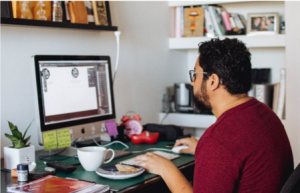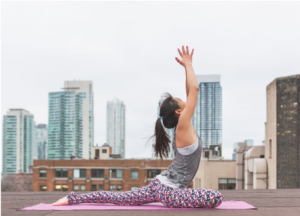The Truth About Working From Home: Is It Killing You?

Denver is one of the most concentrated areas of the country for telecommuting. Pop into a neighborhood café or brewery on any given day and the evidence is clear…we are a culture of remote workers looking for virtual offices. A few months ago I started working from home, and it’s not my first swing at it. There are WONDERFUL things about working from home, and there are tragic consequences. Read on for the lowdown!
The Good!
- The Commute: It’s no secret that hectic commutes result in stress-related health issues, effected work performance, and a negative impact on personal relationships. Some known risks are high blood pressure, heart attack, depression, increased irritability anger and resentment at work, and inability to focus. Therefore, the short jaunt in your loungewear from the bedroom to the desk is a dream for many who are looking to squeeze out
 every last restful moment between luxurious sheets and feathers on a pillow-top divan.
every last restful moment between luxurious sheets and feathers on a pillow-top divan. - Less Distraction: If I have the choice of going to the office or staying home, there is a serious impact on the quality and the quantity of work I get accomplished. Office drama and the latest gossip can chew up a vast amount of productivity. Idle chatting around the water cooler, break room flirtations, and people stopping by your desk “just to ask a question” can be eliminated and that’s a WIN-WIN situation. At home it’s nose to the ground with limited distractions!
- Flex-time: When working from home, your schedule can be your own design. It can be easier to take time out to perform practical tasks like throwing in a load of laundry or walking the dog. It also gives more leeway to take a
 break for a workout or to eat sensibly, as there is less of a temptation for joining in the office “take-out” order.
break for a workout or to eat sensibly, as there is less of a temptation for joining in the office “take-out” order. - Saving Money: Between gasoline consumption, carbon footprints, mileage put on vehicles, eating out, and the performance time spent on any given task…working from home is a clear winner on the wallet and the paycheck!
- Better Beverages: Working at home gives coffee snobs the often overlooked perk of brewing their own perfect French press or pourover! To say nothing about diving into that happy hour cocktail just as office workers are clocking out. Is there a positive impact on quality of work…that’s yours to decide!
The Bad!
- Isolation: Those who work from home may go an entire day without a single human interaction. Social
 isolation can lead to depression, frustration, loss of motivation, and lack of mental stimulation, which has been proven to keep the brain healthy. Getting outside for fresh air, staying connected with friends and good communication habits with co-workers will help.
isolation can lead to depression, frustration, loss of motivation, and lack of mental stimulation, which has been proven to keep the brain healthy. Getting outside for fresh air, staying connected with friends and good communication habits with co-workers will help. - No Boundaries: Working from home may mean you are available at all hours of the day. In fact, many at-home workers feel they must answer the phone on the very first ring, don’t take a break for meals, and have difficulty distinguishing their personal time from work. Setting clear boundaries such as “Don’t call me before 9 a.m.” or “After 7 p.m is my dedicated family time” can make a real difference. Whatever it is can wait!
- Out of the Loop: No matter how you spin it, there is a ton of casual collaboration that happens at the office…getting peer opinions on best practices, bouncing ideas off of each other, impromptu brainstorming sessions on break all are irreplaceable results of face-to-face teamwork
The Ugly!
 Silent Killer: Working from home with fewer distractions and without regular walks around the office can leave one so engrossed in work they are likely to sit for longer periods of time. The World Health Organization attributes approximately 3.2 million deaths each year due to insufficient physical activity! Five or more hours of sedentary sitting can be equivocated to smoking a pack and a quarter of cigarettes. The killer, particularly sitting for hours at a time, is a health risk regardless of what you do with the rest of your day…even if you exercise! Standing vs. sitting burns more calories and uses large muscle groups in the back and legs. Break up your day with the use of standing desks, intervals of stretching, and take the extra time you’d spend
Silent Killer: Working from home with fewer distractions and without regular walks around the office can leave one so engrossed in work they are likely to sit for longer periods of time. The World Health Organization attributes approximately 3.2 million deaths each year due to insufficient physical activity! Five or more hours of sedentary sitting can be equivocated to smoking a pack and a quarter of cigarettes. The killer, particularly sitting for hours at a time, is a health risk regardless of what you do with the rest of your day…even if you exercise! Standing vs. sitting burns more calories and uses large muscle groups in the back and legs. Break up your day with the use of standing desks, intervals of stretching, and take the extra time you’d spend  commuting to actually work out! Unused muscles cause atrophy, shift from endurance muscle fibers that burn fat, to fibers that rely on glucose. Inactive muscles cause metabolic changes and loss of mitochondria, which burn fat. When muscles rely more on carbohydrates, blood becomes very fatty, and that’s why sitting can be linked to heart disease. Insulin resistance can happen very quickly. Simply standing up every 20 minutes or pacing around the room 5 minutes every hour can take a lot of glucose out of the bloodstream!
commuting to actually work out! Unused muscles cause atrophy, shift from endurance muscle fibers that burn fat, to fibers that rely on glucose. Inactive muscles cause metabolic changes and loss of mitochondria, which burn fat. When muscles rely more on carbohydrates, blood becomes very fatty, and that’s why sitting can be linked to heart disease. Insulin resistance can happen very quickly. Simply standing up every 20 minutes or pacing around the room 5 minutes every hour can take a lot of glucose out of the bloodstream!

















